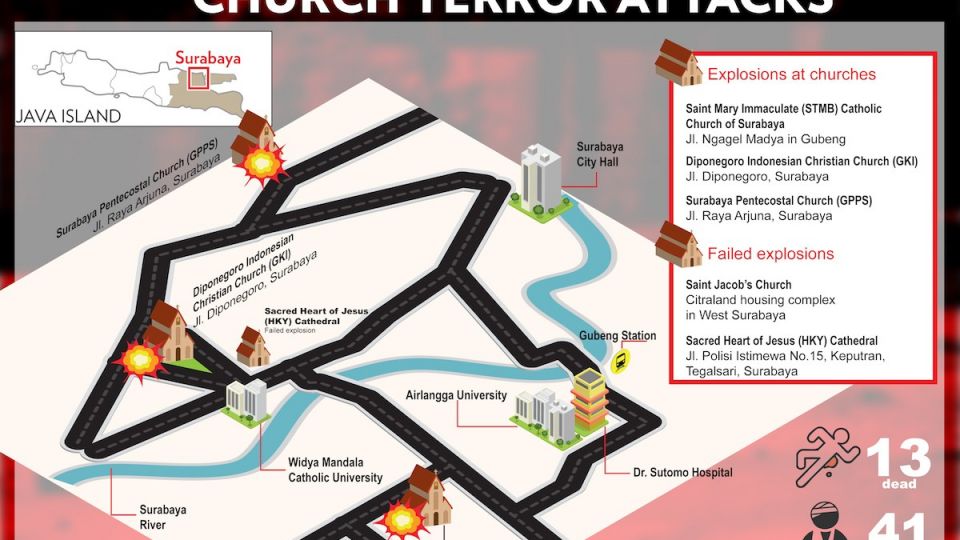May 14, 2018
The Islamic State has claimed responsibility for the attack in Indonesia’s second-largest city.
We deeply mourn those who died in the church attacks on Sunday in Surabaya, East Java. At least 13 people, mostly churchgoers, died in a series of blasts, allegedly suicide bombings, putting the country on high security alert yet again. And again, people of all backgrounds have expressed a united stand against terror.
The Islamic State (IS) movement has claimed responsibility for the attack in the country’s second-largest city, and it has put Indonesia further on edge after reeling from a standoff at the National Police’s Mobile Brigade headquarters (Mako Brimob) detention center, which left five police officers dead. Following the Mako Brimob standoff, the National Police has taken significant steps to mitigate the danger, including transferring dozens of terror convicts and detainees from the detention center to Nusakambangan prison island off Cilacap in Central Java. On Sunday, the National Police’s Densus 88 counterterrorism squad tracked down four suspected terrorists in Cianjur, West Java, and killed them in a shootout.
It is not clear if the Mako Brimob standoff is somehow related to the Surabaya attacks, but whoever planned the bombings on Sunday seemingly decided to up the ante with attacks that involved a suicide bomber riding a motorbike, explosives stored in a car and a mother blowing herself up. It was apparently designed to create carnage and maximum destruction.
The Surabaya bombings also appear to be the culmination of a series of attacks launched against churches. In 2016, an IS sympathizer threw a Molotov cocktail at a Protestant church in Samarinda, East Kalimantan, killing a toddler and injuring three other children. Earlier this year, another IS sympathizer attacked churchgoers at Sunday Mass in Yogyakarta, injuring four people. Now, after years of radicals directing their attacks on security personnel as well as foreigners, the Surabaya bombings bring us full circle to 2000, when coordinated Christmas bombings killed 19 people across the country.
This security problem could not have come at a worse time for the country. In less than three months, Indonesia is scheduled to host the Asian Games, where over 15,000 athletes from 45 countries are expected to compete. Prior to Sunday’s attacks, the only worry for the Games organizers was that some of the venues would not be ready by the time the event kicks off. Now, they have even more reason to be tense.
In November, the resort island of Bali will host the annual meetings of the International Monetary Fund (IMF) and the World Bank, and the impact from the Surabaya attacks could complicate efforts to secure the event. The Surabaya bombings also took place at the height of the political campaigning season for regional elections in some of the country’s bellwether provinces, including East Java.
Next year, for the presidential election, security challenges will be even greater. What happened in Surabaya must serve as a wake-up call for security authorities to ramp up their counterterrorism efforts — and quick.


